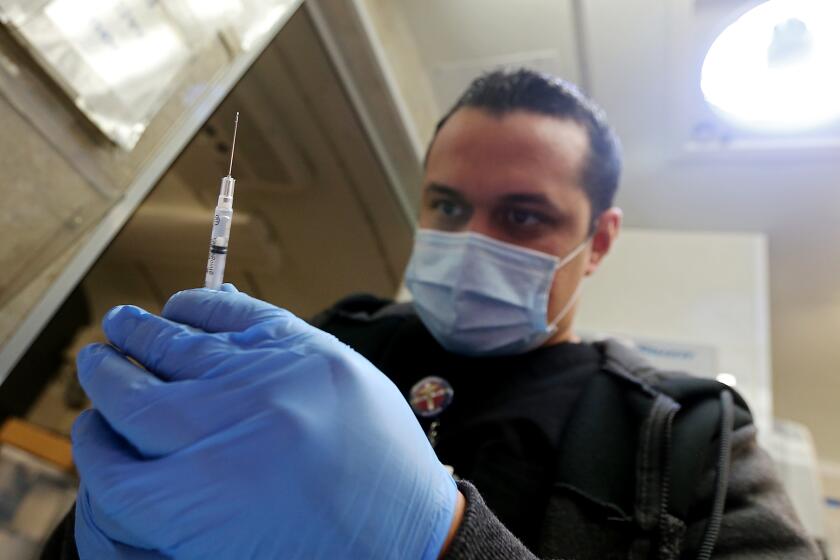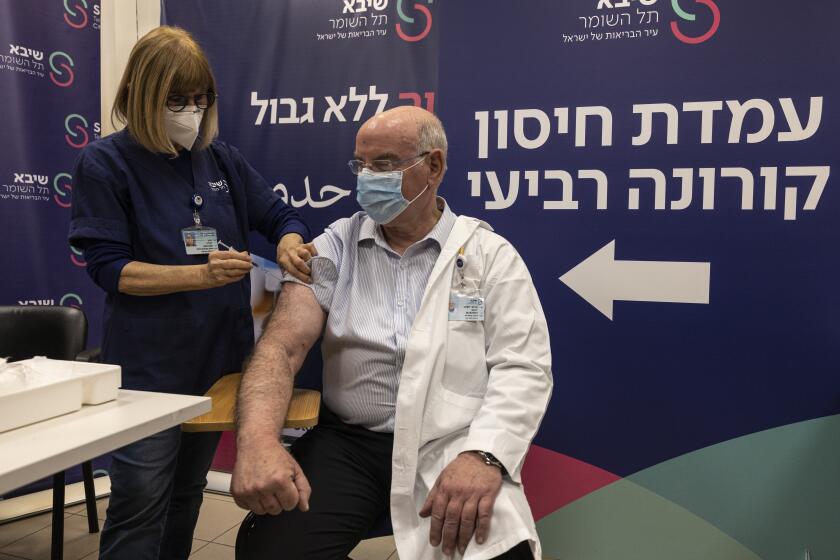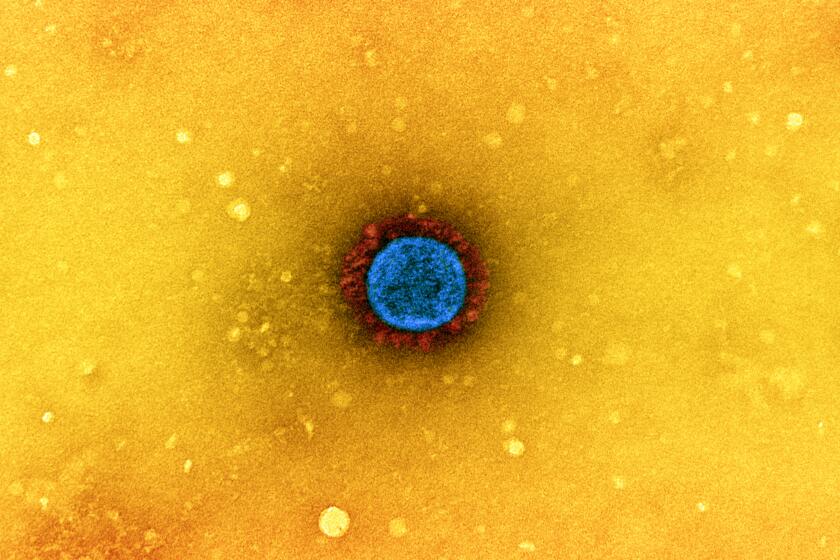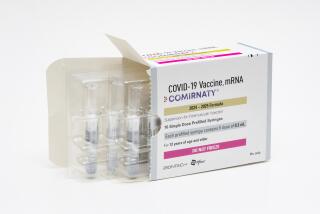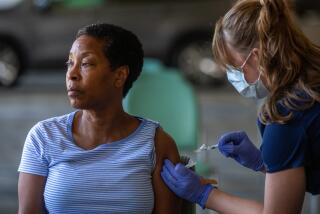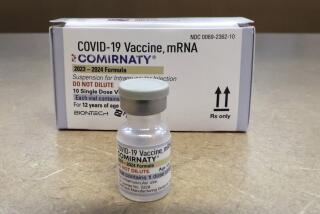FDA and CDC sign off on second Pfizer or Moderna booster shot for people 50 and older

The Food and Drug Administration has authorized another booster dose of the Pfizer and Moderna COVID-19 vaccines for people age 50 and up.
- Share via
U.S. regulators Tuesday authorized an additional COVID-19 booster shot for people age 50 and older, a step to offer extra protection for the most vulnerable in case the coronavirus rebounds.
The Food and Drug Administration’s decision allows for a fourth dose of the Pfizer-BioNTech or Moderna mRNA vaccines to those people at least four months after their previous booster shot.
A few hours later, the Centers for Disease Control and Prevention said it would update its recommendations to keep step with the FDA action. The CDC added that adults who received a primary shot and booster dose of the Johnson & Johnson vaccine could get a second booster dose of an mRNA vaccine if four months had passed since their initial booster.
Until now, the FDA had cleared fourth doses only for people 12 and older who have severely weakened immune systems. The agency said this especially vulnerable group can now also get yet another booster, for a fifth shot, and the CDC agreed.
The latest expansion to everyone over 50, regardless of their health, allows an extra shot to millions more Americans. The question, however, is whether everyone who’s eligible should rush out and get it.
Dr. Rochelle Walensky, the CDC director, said a second booster “is especially important for those 65 and older and those 50 and older with underlying medical conditions that increase their risk for severe disease from COVID-19.”
The agency is continuing to “evaluate the need for additional booster doses for all Americans,” she said.
From Feb. 27 to March 5 — the most recent data available — 14.7% of coronavirus cases sequenced in L.A. County were found to be BA.2, up from 6.4% the prior week.
The move comes at a time of great uncertainty. COVID-19 cases have dropped to low levels after a winter surge fueled by the highly contagious Omicron variant. Two vaccine doses plus a booster still provide strong protection against severe disease and death, CDC data show.
But an Omicron sibling, the BA.2 variant, is causing causing a worrisome jump in infections in Europe — and is spreading in the U.S. — even as vaccination efforts have stalled. About two-thirds of Americans are fully vaccinated, and half of those eligible for a first booster haven’t gotten one.
Pfizer had asked the FDA to clear a fourth shot for people 65 and older, while Moderna requested another dose for all adults “to provide flexibility” for the government to decide who really needs one.
There’s limited evidence to tell how much benefit a second booster could offer right now. The FDA made the decision without input from its independent panel of experts that has wrestled with how much data is required to expand shots.
“There might be a reason to top off the tanks a little bit” for older people and those with other health conditions, said University of Pennsylvania immunologist E. John Wherry, who wasn’t involved in the government’s decision.
But while he encourages older friends and relatives to follow the advice, the 50-year-old Wherry — who is healthy, vaccinated and boosted — doesn’t plan on getting a fourth shot right away. With protection against severe illness still strong, “I’m going to wait until it seems like there’s a need.”
With unvaccinated refugees from Ukraine pouring into other countries, health officials hope to avert outbreaks of COVID-19 and other diseases.
None of the COVID-19 vaccines is as strong against the Omicron strain as they are against earlier versions of the virus. Also, protection against milder infections naturally wanes over time. But the immune system builds multiple layers of defense, and the type that prevents severe illness and death is holding up.
During the U.S. Omicron wave, two doses were nearly 80% effective against needing a ventilator or dying — and a booster pushed that protection to 94%, the CDC recently reported. Vaccine effectiveness was lowest — 74% — in immunocompromised people, the vast majority of whom hadn’t gotten a third dose.
U.S. health officials also looked at Israel, which during the Omicron surge offered a fourth dose to people 60 and older at least four months after their last shot. Preliminary data posted online last week suggested some benefit: Israeli researchers counted 92 deaths among more than 328,000 people who got the extra shot, compared to 232 deaths among 234,000 people who skipped the fourth dose.
Another study of Israeli healthcare workers found that those who opted for a fourth shot at the height of the Omicron wave were only marginally more protected than their peers who received three doses.
Getting a second booster dose of Pfizer and BioNTech’s Comirnaty vaccine reduced the risk of infection by 30% and the risk of developing COVID-19 symptoms by 43%, researchers reported in the New England Journal of Medicine. If the fourth dose was a shot of Moderna’s Spikevax vaccine, recipients were only 11% less likely to become infected and 31% less likely to become ill.
A study of healthcare workers finds that a second booster dose of Pfizer’s COVID-19 vaccine did little to prevent Omicron infections.
Given the limited data, it’s far from clear how long any extra benefit from another booster would last, and thus when to get it.
“The ‘when’ is a really difficult part. Ideally we would time booster doses right before surges, but we don’t always know when that’s going to be,” said Dr. William Moss of the Johns Hopkins Bloomberg School of Public Health.
Plus, a longer interval between shots helps the immune system mount a stronger, more cross-reactive defense.
“If you get a booster too close together, it’s not doing any harm — you’re just not going to get much benefit from it,” Wherry said.
When the coronavirus attacks the body, the immune system steps up, trying to respond quickly and powerfully enough to stop the virus from running wild.
The newest booster expansion may not be the last: Next week, the FDA will hold a public meeting to debate whether everyone will eventually need a fourth dose, possibly in the fall, of the original vaccines or an updated shot.
As for updating vaccines, studies in people — of Omicron-targeted shots alone or in combination with the original vaccine — are underway. The National Institutes of Health recently tested monkeys and found “no significant advantage” to using a booster that targets just Omicron.
Times staff writer Melissa Healy contributed to this report.
More to Read
Sign up for Essential California
The most important California stories and recommendations in your inbox every morning.
You may occasionally receive promotional content from the Los Angeles Times.
